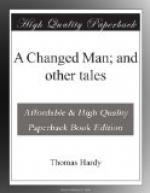The road from Chalk-Newton to Broad Sidlinch is about two miles long and in the middle of its course, where it passes over the ridge dividing the two villages, it crosses at right angles, as has been stated, the lonely monotonous old highway known as Long Ash Lane, which runs, straight as a surveyor’s line, many miles north and south of this spot, on the foundation of a Roman road, and has often been mentioned in these narratives. Though now quite deserted and grass-grown, at the beginning of the century it was well kept and frequented by traffic. The glimmering light appeared to come from the precise point where the roads intersected.
‘I think I know what that mid mean!’ one of the group remarked.
They stood a few moments, discussing the probability of the light having origin in an event of which rumours had reached them, and resolved to go up the hill.
Approaching the high land their conjectures were strengthened. Long Ash Lane cut athwart them, right and left; and they saw that at the junction of the four ways, under the hand-post, a grave was dug, into which, as the choir drew nigh, a corpse had just been thrown by the four Sidlinch men employed for the purpose. The cart and horse which had brought the body thither stood silently by.
The singers and musicians from Chalk-Newton halted, and looked on while the gravediggers shovelled in and trod down the earth, till, the hole being filled, the latter threw their spades into the cart, and prepared to depart.
‘Who mid ye be a-burying there?’ asked Lot Swanhills in a raised voice. ‘Not the sergeant?’
The Sidlinch men had been so deeply engrossed in their task that they had not noticed the lanterns of the Chalk-Newton choir till now.
‘What—be you the Newton carol-singers?’ returned the representatives of Sidlinch.
’Ay, sure. Can it be that it is old Sergeant Holway you’ve a-buried there?’
‘’Tis so. You’ve heard about it, then?’
The choir knew no particulars—only that he had shot himself in his apple-closet on the previous Sunday. ’Nobody seem’th to know what ’a did it for, ‘a b’lieve? Leastwise, we don’t know at Chalk-Newton,’ continued Lot.




